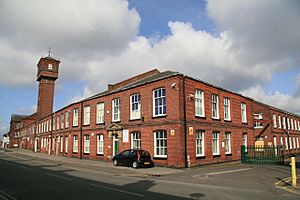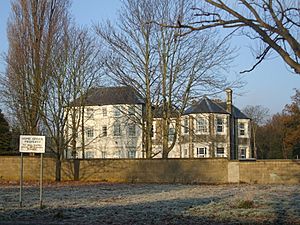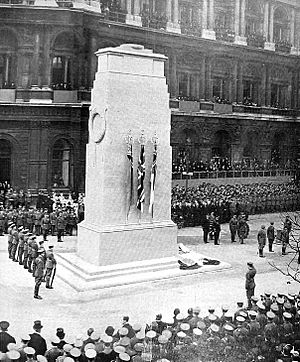James Larratt Battersby facts for kids
James Larratt Battersby (born February 5, 1907 – died September 14–29, 1955) was a British man who held strong political beliefs. He was a pacifist, meaning he believed in peace and was against war. He also supported fascism, a political idea where the government has total control and often uses force. Battersby came from a family of hatmakers in Stockport, England. Because of his political views, he had to leave his family business. During World War II, the British government held him in a special camp, like many other British people who supported fascism. While he was held there, he started to believe that Adolf Hitler was actually Christ returned to Earth. After the war, he wrote a book called The Holy Book and Testament of Adolf Hitler about his beliefs.
Contents
Early Life and Family History

James Larratt Battersby was born in Stockport in 1907. His father, James Johnson Battersby, was part of the well-known family business, Battersby Hats. James junior also became a director in the company. An interesting family story is that his father was a passenger on the ship RMS Lusitania when it was sunk by a German submarine in 1915. He was one of the last people rescued before the ship went down.
In 1935, James Battersby married Cynthia Helène Metcalfe in Stockport. They had four children together.
His Fascist Beliefs
In the 1930s, James Battersby became very interested in fascism. He joined Oswald Mosley's British Union of Fascists (BUF) and became a local leader for the group in Stockport. He often gave speeches about his ideas. For example, in 1934, he spoke about protecting the cotton industry in Lancashire. He believed that some people were harming British jobs by supporting cheaper goods from other countries.
In his speeches, Battersby would explain his reasons for supporting fascism in Britain. He sometimes faced people who disagreed with him, but he continued to share his views. He also gave talks at places like a Sunday school in Stockport, where he and his wife met the children afterwards. Battersby also gave money to the BUF to support their activities. As he became more involved, he eventually had to leave his family's hat business in August 1939. He was even known as "the mad hatter" by some people in fascist groups. He left his wife and children because he felt he needed to "serve Hitler."
During World War II
After World War II began in 1939, the British government started to detain people they thought might be a risk. In June 1940, James Battersby was held under a special rule called Defence Regulation 18B. He was sent to a place called Camp 020 at Latchmere House in London, along with other people who supported fascism. He later wrote a diary about his time there, saying that everything was done to "agitate, frustrate and torment us."
Another fascist leader, Charlie Watts, also remembered Battersby at Latchmere House. He wrote about the small amounts of food they received and how guards would threaten them. Later, both Battersby and Watts were moved to another camp in Berkshire. They became good friends there.
Battersby was then moved to the Isle of Man with other fascists. There, he met Captain Thomas Baker. Baker believed that Adolf Hitler was Christ returned and performed religious ceremonies based on this idea. Battersby took these ideas very seriously, and they influenced his own strong religious beliefs. In June 1943, Battersby was released. He appeared before a group that dealt with conscientious objectors (people who refuse to fight in wars for moral or religious reasons). He offered to share his views with the British public, but his offer was not accepted.
Kingdom House Community
After World War II ended, Battersby started a religious group called the Legion of Christian Reformers. This group was also known as the League of Christian Reformers or the Christian Herald Group. They lived at Kingdom House in River, West Sussex. This house was given to them by a wealthy supporter. At Kingdom House, they held special services where they worshipped Adolf Hitler as Christ, believing he had returned to get rid of evil in the world. They even had two large dogs guarding their altar during these services.
The group's activities quickly caught the attention of politicians and newspapers. In November 1945, a newspaper reported that someone had bought two swastika flags (symbols used by the Nazis) and planned to give them to James Battersby. The newspaper also wrote that Thomas Baker and his wife, along with a few others, lived at Kingdom House. They hoped to have a community of up to 16 people who could support themselves. They held prayers every morning and evening in a small chapel.
Politicians also discussed the group. On December 4, 1945, a Member of Parliament named Christopher Peto asked the government to stop the Kingdom House group because it upset many people. However, the government replied that they could not stop the group just because it was unpopular, as long as its members were not breaking any laws. Another newspaper reported that a Russian youth paper had compared the Kingdom House group to "spreading the germs of the plague." The group's secretary replied that they saw Hitler as a "divine instrument."
In December 1945, some unknown people carried out an unofficial "raid" on Kingdom House. The group closed down soon after.
A "Practical Christian"
In 1946, Battersby was back in Stockport. He edited a journal called The Christian Digest and Witness, which later became The Kingdom Herald. This journal called itself "The most outspoken journal in Britain." He also published pamphlets under the name "Practical Christian."
In 1949, Battersby traveled to South Africa. He tried to set up places to remember Hitler, but he was not successful. After he returned to the UK, the South African government said he was an "undesirable immigrant" to stop him from visiting their country again.
Arrested at the Cenotaph
In 1952, James Battersby caused a disturbance at the Cenotaph in London. The Cenotaph is a war memorial where people gather for a two-minute silence each year to remember those who died in wars. During this silence, Battersby shouted things like, "This is the day of English judgement. I speak the truth. English children must be saved. Trust God and the eternal Christ. Heil Hitler." He then stood to attention and gave the Nazi salute. Police arrested him and took him to the police station. He was charged with "insulting behavior" that could cause trouble and using insulting words.
Battersby said he was not guilty. A police officer explained that Battersby was arrested for his own safety because the crowd became angry. Battersby had five photos of Hitler and a paper with his shouted words written on it. He also had letters from doctors from 1947 saying he was mentally sound.
Battersby claimed he spoke out of a "deepest sense of responsibility to God and to my fellow countrymen." He said he had studied religion for 25 years and that the "judgement" he spoke of was for the whole world, not just one country. He claimed his exact words were slightly different. He said he had been planning his actions for 12 months. Battersby was fined £10 or faced two months in prison for his insulting behavior.
His Death
In 1955, Battersby disappeared from his home in Southport, Lancashire. He had written a letter to a newspaper saying: "My work here is complete. I follow the Fuehrer to glory and eternity. Through the sacrifice of the Aryan martyrs our world victory is assured. Heil Hitler." He died soon after.
John Charnley, a former leader in the BUF, wrote about his friendship with Battersby in his book. He said that Battersby felt very sad and down after the German army's defeat at the Battle of Stalingrad in 1943. He was later cared for by doctors and released. Charnley also shared his sadness and regret when he heard about Battersby's death.
Battersby's youngest daughter, Amanda K. Hale, has written a novel about her father called Mad Hatter. The book explores his involvement in politics and religion, and how his absence and death affected her and her family.
Selected Publications
- The Bishop Said Amen: On the author's experiences during detention as a pacifist. With a portrait. Kingdom Press, Poynton, 1947.
- Aryan Testament: The Holy Book and Testament of Adolf Hitler. On the Legion of Christian Reformers. With portraits. Kingdom Press, Manchester, 1951.
- The Holy Book of Adolf Hitler. J. L. Battersby for the German World Church in Europe, Southport, 1952.
 | Misty Copeland |
 | Raven Wilkinson |
 | Debra Austin |
 | Aesha Ash |



